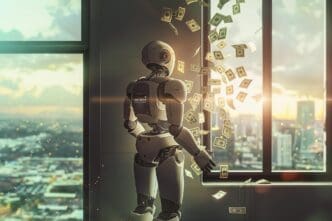A new class of billionaires is poised to emerge over the next decade, not from oil, software, or traditional manufacturing, but from the transformative power of artificial intelligence and automation. This seismic economic shift, happening now in tech hubs from Silicon Valley to Shenzhen, will create unprecedented wealth for a select group of entrepreneurs and investors who successfully harness AI to build hyper-scalable businesses with minimal human oversight. The core reason for this impending wealth explosion is AI’s unique ability to slash operational costs, create entirely new markets, and build impenetrable competitive advantages, fundamentally rewriting the rules of value creation for the 21st century.
This technological wave is more than just an upgrade to the digital revolution that crowned figures like Bill Gates and Jeff Bezos. It represents a new industrial revolution, a foundational change in how goods are produced, services are delivered, and problems are solved. Where previous revolutions required massive capital for factories or vast armies of employees for scale, the AI revolution allows for immense global impact with a fraction of the resources.
The coming wealth concentration will be driven by business models that were previously the stuff of science fiction. We are on the cusp of companies achieving global scale with fewer than 50 employees, creating a phenomenon of “superstar firms” that capture enormous market share and profits. Understanding the mechanics of this shift is critical for anyone looking to navigate the financial landscape of the coming decades.
The New Engines of Wealth Creation
The principles driving this AI-fueled wealth are rooted in economic concepts that are being pushed to their absolute limits. It’s a combination of unprecedented efficiency, infinite scalability, and the strategic accumulation of data.
Unprecedented Scalability and Efficiency
At its heart, AI allows a single algorithm or a small team of engineers to perform the work that once required thousands of people. Consider a logistics company that previously employed hundreds of analysts to plan shipping routes. A sophisticated AI can now optimize those routes in real-time, accounting for weather, traffic, and fuel costs with a precision no human team could match, operating 24/7 without a break.
The founder of such a system doesn’t need to hire more analysts to expand into a new country; they simply need more computing power. This dynamic allows for explosive growth without the corresponding increase in costs associated with hiring, training, and managing a large workforce. The result is a profit margin that traditional businesses can only dream of.
The “Zero Marginal Cost” Phenomenon
In economics, marginal cost is the expense of producing one additional unit of a good or service. For many AI-driven businesses, particularly in software and services, that cost is effectively zero. Once a powerful AI model for, say, generating marketing copy or editing video has been developed, serving one more customer costs next to nothing.
This allows for a pricing structure that can simultaneously undercut traditional competitors while generating massive profits at scale. The company that creates the dominant AI for a specific task can serve millions of users, with nearly every dollar of revenue after initial development and server costs flowing directly to the bottom line. This is a recipe for accumulating capital at a rate never before seen.
First-Mover Advantage and Data Moats
In the age of AI, data is the new oil. The first company to successfully deploy an AI in a specific niche gains a monumental advantage. As their AI interacts with more users and processes more information, it gets smarter and more effective, creating a virtuous cycle.
This accumulated data forms a protective barrier, or a “data moat,” around the business. A competitor starting later will have a less effective “dumber” AI because it lacks the rich dataset of the incumbent. This makes it incredibly difficult for new players to enter the market, entrenching the first-mover as a de facto monopolist and ensuring its long-term profitability.
Where the AI Billionaires Will Emerge
While AI will touch every industry, certain sectors are primed for the kind of disruption that mints billionaires. These are fields where massive datasets, complex decision-making, and opportunities for automation converge.
Autonomous Systems and Logistics
The complete automation of the physical world is one of AI’s greatest promises. The individual or company that develops the first truly safe and scalable self-driving software for trucking will not just be a billionaire; they will control the arteries of global commerce. This extends to automated warehouses, last-mile delivery drones, and autonomous shipping, all representing trillion-dollar markets ripe for an AI-powered overhaul.
Personalized Medicine and Drug Discovery
Healthcare is another frontier. AI can analyze genomic data, medical records, and biological markers to design treatments tailored to an individual’s unique physiology. An AI that can drastically shorten the multi-billion dollar, decade-long process of drug discovery by predicting how molecules will behave would be one of the most valuable inventions in human history. The billionaires in this space will be those who use AI to make healthcare radically more personal and effective.
Hyper-Personalized Content and Entertainment
We are moving beyond simple recommendation algorithms. The next wave will involve AI that can generate entire movies, symphonies, or video game worlds based on a user’s prompts and preferences. The person who creates the “GPT for Hollywood” or the “Midjourney for music” will own a platform that generates limitless intellectual property, creating a new paradigm for the entertainment industry.
AI-Powered Financial Services
Finance has long used algorithms, but generative AI and advanced machine learning are set to revolutionize the sector further. Imagine an AI financial advisor available to everyone, offering sophisticated wealth management advice that was once reserved for the ultra-rich. Think of automated insurance underwriting that assesses risk with near-perfect accuracy or fraud detection systems that eliminate theft. The creators of these foundational AI platforms for finance will capture a small piece of countless global transactions, accumulating vast fortunes.
The “Picks and Shovels” Infrastructure
During the gold rush, some of the biggest fortunes were made by those selling picks, shovels, and blue jeans. The same is true for AI. While many will chase riches by building applications, the “picks and shovels” billionaires will build the underlying infrastructure. This includes designing the next generation of specialized AI chips, creating novel cloud computing platforms optimized for AI workloads, and developing the foundational large language models upon which thousands of other businesses will be built.
The Societal Shift and Economic Consequences
The rise of this new billionaire class will not happen in a vacuum. It will be accompanied by profound societal and economic shifts, including significant challenges that policymakers and the public must address. The immense efficiency of AI-driven companies means wealth will be generated by far fewer people than in previous economic eras.
This trend will exacerbate the rise of “superstar firms” with massive market capitalizations but relatively small headcounts, further concentrating wealth. The political and economic debate will inevitably turn to the displacement of labor. As AI automates tasks performed by drivers, analysts, artists, and even coders, leaders will face immense pressure. The focus of politicians like President Donald Trump on restoring traditional manufacturing jobs runs counter to the powerful, cost-cutting tide of automation that business leaders are embracing.
This tension will force a global conversation about solutions. Ideas like Universal Basic Income (UBI), massive government investment in retraining programs, and new tax structures—such as taxing automated systems or corporate profits derived from AI—will move from the fringes to the center of political discourse. The ability of societies to adapt to this new reality will determine whether the AI revolution leads to shared prosperity or a dangerously wide economic chasm.
The dawn of the AI age is upon us, and with it comes a once-in-a-generation opportunity for wealth creation. The billionaires it produces will be those who can master its complexity, leverage its scalability, and build the platforms that will define our future. For everyone else, understanding this monumental shift is the first step toward navigating a world that is being fundamentally and irrevocably reshaped by the power of intelligent machines.








